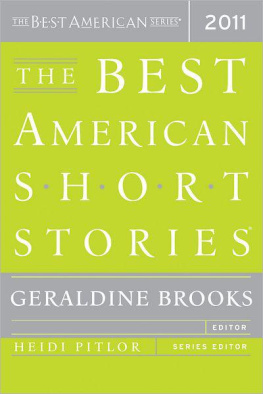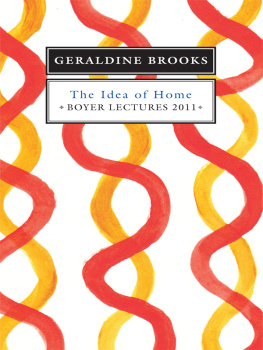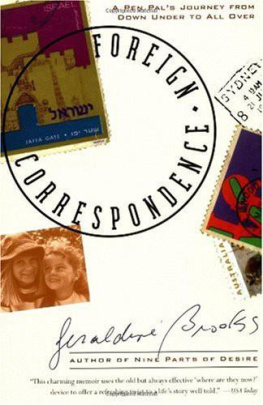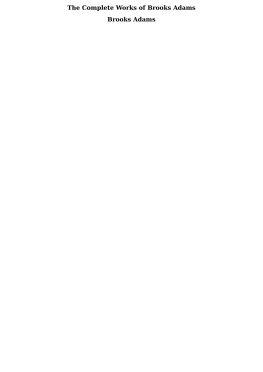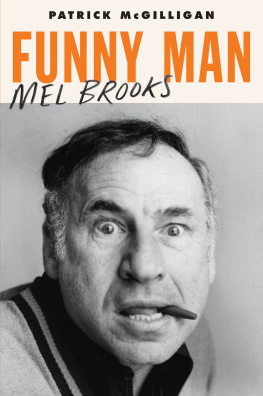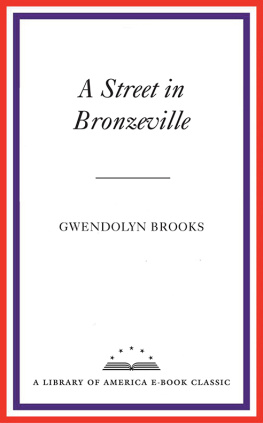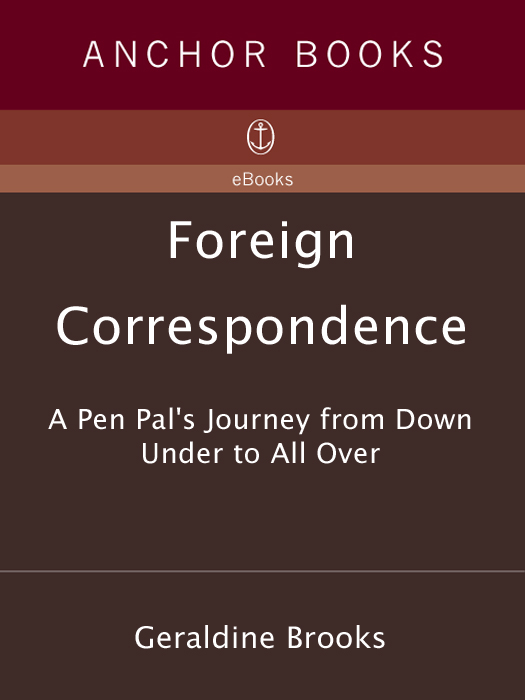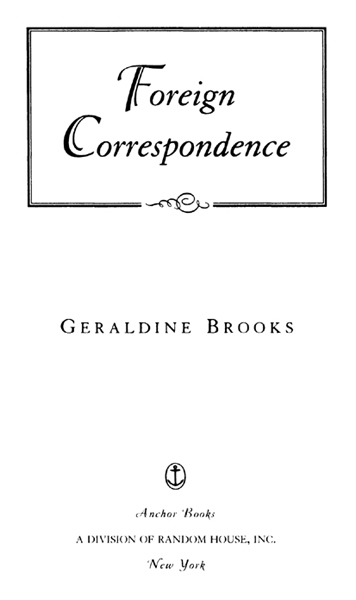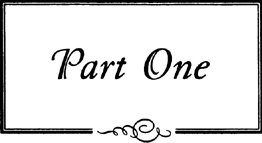FIRST ANCHOR BOOKS TRADE PAPERBACK EDITION, JANUARY 1999
Copyright 1998 by Geraldine Brooks
All rights reserved under International and Pan-American Copyright Conventions. Published in the United States by Anchor Books, a division of Random House, Inc., New York, and simultaneously in Canada by Random House of Canada Limited, Toronto. Originally published in hardcover in the United States by Anchor Books in January 1998.
Anchor Books and colophon are registered trademarks of Random House, Inc.
The Library of Congress has cataloged the Anchor hardcover edition of this book as follows:
Brooks, Geraldine.
Foreign correspondence: a pen pals journey from Down Under to all over / by Geraldine Brooks. 1st Anchor Books ed.
p. cm.
1. Brooks, Geraldine. 2. Foreign correspondentsAustraliaBiography. I. Title.
PN5516.B76A3 1998
070.4332092dc21
[B] 97-15413
eISBN: 978-0-307-77364-7
www.anchorbooks.com
v3.1
To the memory of Lawrie, and to Gloria
nothing is more sweet in the end than country and parents ever, even when far away one lives in a fertile place
The Odyssey
ACKNOWLEDGMENTS
I would like to thank Martha Levin and Elise OShaughnessy for convincing me to write this book; Darleen and Michael Bungey, Miki Bratt, Sarah and David Chalfant, Charlie Conrad, Elinor Horwitz, Brian Hall, Gail Morgan and Tina Pohlman for their comments on its early drafts; Joshua Horwitz, all-purpose sage; and Sara Mauck, without whose help it wouldnt have been finished.
Above all, I would like to thank the two men in my life: Tony, who put the idea in my head and then helped to get it on the page, and Nathaniel, whose full-throated comments and occasional efforts at the keyboard made it easier to reenter the world of my own childhood.
1
 Post Marked
Post MarkedIt is a hot spring day and I am in the basement of my parents house in Sydney, sorting through tea chests. Pine floorboards creak above my head as my mother steps beside my fathers bed, checking his breathing mask. The old floor is thin and while I cant make out her words I recognize the tone, its veneer of cheerfulness layered on anxiety.
From my father, propped up on pillows, I hear nothing. He barely speaks anymore. His voicethe beautiful voice that once made his livingis silenced by the simple effort of breathing. He is staring toward a picture window that frames a view of ocean through a fluttering fringe of gum leaves. But he cant see it. His eyes, almost sightless now, are the whitened blue of faded cornflowers.
When my father moved to this beach house just after his retirement, he should have had the leisure to sort his old sheet music, to work on his half-composed tunes, read his cricket books, enjoy his correspondence. Instead, he became ill that year and never found the energy even to unpack. So I have come down here to do it, because I dont think I will have the heart to face these things once he is dead.
The dirt floor of the unfinished basement is cool against my bare legs, and I take my time. Twelve years of dust has filtered through the flimsy lids. Spiders scurry away, indignant, as I disturb them.
My father squirreled away everything. There are yellowed news clippings about his career as a big-band singer in Hollywood and Hawaii in the 1930s, before he came to Australia. There are dozens of dog-eared photographs of musicians with frangipani leis lying incongruously against their tuxedos; even more of Australian army mates in slouch hats at the Pyramids, in Jerusalems Old City, among the huge-leaved trees of New Guinea.
And there are letters, piles of them. Replies to every piece of correspondence my father ever wrote. He wrote, I realize as I unfold the brittle pages of fifty-year-old letters, to everyone. From 1931, there is a two-line note from Albert Einstein, in verse, responding to a request for permission to perform a ditty about him that my father had composed. Einstein writes: Though somewhat silly, I dont mindtheres no objection I can find! There is White House stationerya 1969 reply from the chairman of the Council of Economic Advisers thanking my father for his good letter on interest rates. There is a 1974 response from the office of Rupert Murdoch answering my fathers complaint about the creasing in his broadsheet newspapers. And a letter from an acoustical expert thanking my father for his suggestions about raising the height of a concert-hall floor to improve the way sound carries.
Each letter is a small piece of the mosaic of my fathers restless mind, its strange mingling of global interests and nitpicking obsessions. Some of the replies raise questions: Why did he write to the Israeli Minister of Defense in 1976? Where is the poem he wrote about Winston Churchill that the Australian Prime Minister thanks him for in a 1958 letter? My father is beyond answering such questions now. I have left it too late to ask.
Near the bottom of a tea chest is a thick pile of airmail letters that raises an altogether different set of questions. Held by a withered rubber band, they are addressed, in various childish handwritings, to me. As I pull them out and blow the dust off, I recognize them as letters from my pen palsfrom the Middle East, Europe, the United States.
I stare at them, puzzled. It was my mother who saved our school report cards, our drawings and poems, old toys and memorabilia. While I have never doubted that my father loved my sister and me, he rarely involved himself in the day-to-day business of our lives. Yet here, among his things, is more than a decade of my correspondence, from 1966, when I discovered pen pals, to 1979, when my parents moved to this house.
When I wrote to these pen pals, in the late 1960s and 1970s, my family inhabited a very small world. We had no car, had never set foot on an airplane and, despite my fathers American relatives, never thought of making an international telephone call.
In the evenings, families in our neighborhood would gather on the front verandas of their houses and wait for the southerly busterthe big thunderstorm that would break the heat, lay the dust and leave the air cool enough to allow sleep.
I was waiting, too. Waiting for something to happen, and wishing that I lived in a place where something did. Except for relentless coverage of the British royal family, Australian newspapers paid little attention to foreign places. The nightly TV news was more likely to lead with the coliform bacteria count at Bondi Beach than the body count in Vietnam. Yet, at school, our history books were filled with tales of elsewhere. The Great Menand they were all men, in those dayswere British, American, German, French. I was aware from religion class that a few women had made it to greatness via sainthood, but they came from even more distant-sounding placesSt. Theresa of Avila, Bernadette of Lourdes. A St. Margaret of Melbourne or a Diane of Dubbo was clearly out of the question.


